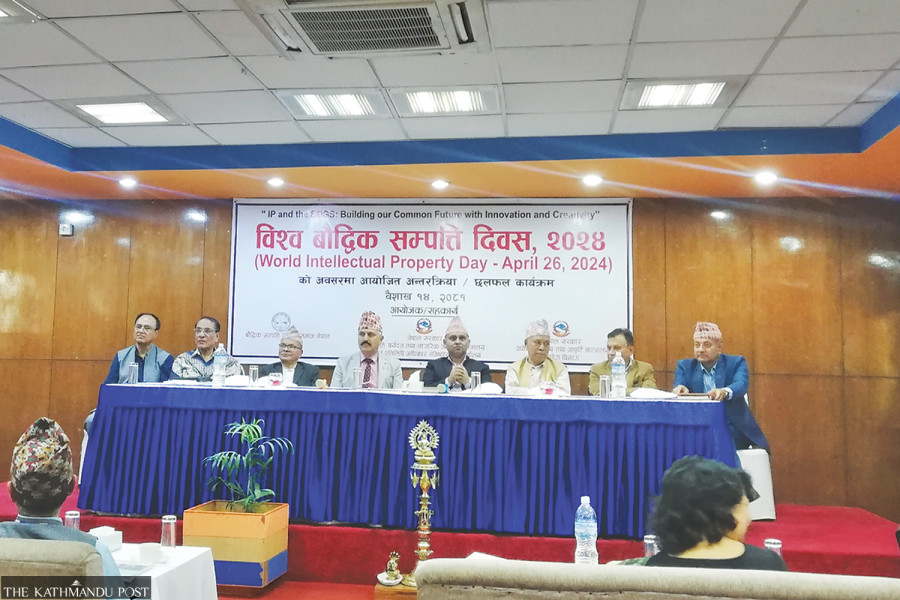Money
Nepal awash with trademark, patent infringement plaints
Industry insiders say it takes years for infringement settlement because the Department of Industry, which handles the cases, is not a fully judicial body.
Krishana Prasain
Nepal’s Department of Industry has been awash with trademark, patent and design infringement complaints, government officials admitted as the country marked World Intellectual Property Day on Friday.
Weak policy enforcement and unstable government for a long time have promoted unlawful use, selling, or copying of patented inventions.
“We have so far received 1,500 complaints regarding trademarks, patents and designs,” said Yagyaraj Koirala, director general of the Department of Industry. “The number shows people are becoming aware of protecting their rights.”
However, industry insiders say settling infringement-related cases in Nepal can take years or even decades. That’s because the Department of Industry which handles infringement cases is not a fully judicial body, and instead depends on the country’s judicial system, which is notorious for delays.
Koirala said that they have prepared a draft law to supersede the existing Patent, Design and Trademark Act of 1965.
“The draft is in the final stage.”
He said that around 113,000 old files of intellectual property rights in the department related to trademarks, patents and design have been digitised. The department said it is in the final stage of developing an intellectual property management information system.
“The department is also working to establish a technology innovation centre with the support of the World Intellectual Property Organization (WIPO) to check patents online,” Koirala said.
Every year, World Intellectual Property Day is observed to spread awareness about the importance of safeguarding intellectual property rights.
Nepal became a member of WIPO in February 1997. WIPO is the global forum for intellectual property policy, services, information and cooperation.
Intellectual property rights are the rights given to persons over the creations of their minds. Intellectual property rights include patents, copyrights, industrial design rights, trademarks, plant variety rights, trade dress, geographical indications, and in some jurisdictions trade secrets.
The Constitution of Nepal has also guaranteed intellectual property rights as a fundamental right.
According to the Global Innovation Index 2023 report by the World Intellectual Property Organization (WIPO), Nepal ranked 108th out of 132 countries surveyed. Nepal ranked 24th among 37 lower middle-income groups of economies.
“Nepal’s position on the Global Innovation Index is disappointing, indicating that the country has a lot more to do improve in the intellectual property rights fronts,” said Dik Bahadur Karki, director at the Department of Industry, addressing a function titled ‘IP and SDGs: Building our Common Future with Innovation and Creativity’.
The event was organised jointly by the Intellectual Property Protection Society Nepal and the Department of Industry.
The participants said that inadequate fines provisioned by the law also prompted trademark and patent infringement in Nepal.
For example, under the existing Patent, Design and Trade Mark law, offenders can be fined Rs100,000 and have their property seized for misusing a registered trademark.
During the function, a government official too admitted that anyone can pay the fine and misuse the trademarks and patents.
Experts say that the weak implementation of the law has discouraged foreign investors from investing in Nepal.
While there have been increasing complaints, applications for trademark registration have also been increasing. However, patent and design registration has been low.
According to the Department of Industry, it received 876 applications for patents till mid-April.
The department, however, has issued only 88 patents—52 for domestic and 36 for foreign companies.
Similarly, the department received 785 applications for designs. The department, however, has issued designs for only 310 companies during the review period. Out of them, 114 were issued for domestic and 196 for foreign firms.
The department received 113,607 applications for trademarks but was able to issue only 63,204.
Out of the total issuance, 34,363 were for the domestic and 28,841 for the foreign companies.
“The registration of patent and design is very disappointing. The lower number of registrations of patents and designs do not encourage industrialisation,” said Karki, the chief of the Industrial Property Section at the Industry Department. “But trademark registrations have been increasing during the last four years,” he said.
“Almost 99 percent of intellectual property rights in Nepal involves trademarks. The share of patent and design is only 1 percent,” said Karki.
Trademark protections include the word, sign, picture, or combination thereof to differentiate the product from others in the market.
The laws governing trademarks never expire. This means the holder has the right to the trademark for the life of the product or service.
“But in Nepal, there is no provision for assigning validity dates to trademarks,” said Karki.
“In other countries, a trademark can be registered for one to 45 years.”
“The Patent, Design and Trade Mark Act is outdated, which does not cover geographical indication, utility model, and traditional knowledge among others,” said Karki.
The other problem, according to Karki, is the manual registration process of intellectual property rights, which is full of hassles and discourages service seekers.
“Cases of trademark infringement and counterfeiting are rising in Nepal alarmingly,” said Karki.
In Nepal, trademark infringement and counterfeit products of multinational companies are sharply increasing. For instance, products like Coca-Cola, Mountain Dew, and KFC are available in the name of Club-Cola, Maintain Dew or Monsoon Dew and KKFC.
Experts said that foreign direct investment from the US in Nepal has been declining due to the lack of a compensation law, which is the number one priority for American investors. As duplicate products are easily available in the market, US investors fear putting money in the country.
Even if a well-known trademark is being stolen, there is no provision in Nepal’s law to differentiate between well-known and lesser-known trademarks.
The well-known trademark is generally published in the Nepal Gazette, but till now, there is no such example of a trademark being published in the Nepal Gazette, according to the participants.




 10.12°C Kathmandu
10.12°C Kathmandu














